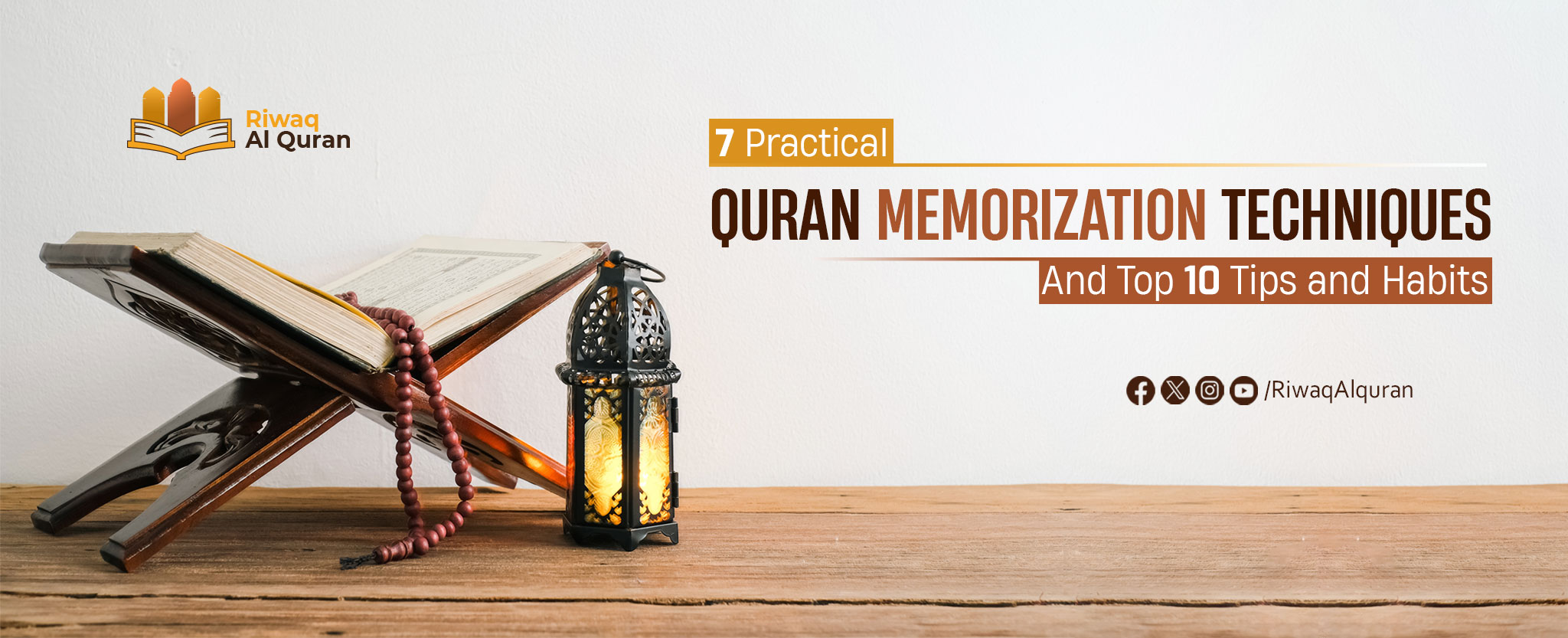Memorizing the Quran requires knowing memorization techniques, dedication, and discipline. Some popular methods include reciting memorized verses during prayers, dividing pages for focused learning, and associating verses with their meanings. Techniques like the 3/10 Hifz method, constant listening, and repeating verses multiple times are also highly beneficial in reinforcing memory and improving retention. A key aspect is understanding the meaning behind the verses, which makes memorization easier and more meaningful.
To better memorize the Quran, you need to create a quiet, focused environment and utilizing technology can further aid in the process. Staying hydrated, practicing patience, and incorporating Quranic memorization into daily life, especially Salah, helps maintain long-term memory retention. This journey, though challenging, is a rewarding endeavor both in this world and the Hereafter.
Memorizing the Quran is an honor in Islam that brings Muslims innumerable virtues in this life and the Hereafter. This whole task of learning it with precise pronunciation could be mentally, spiritually, and physically challenging.
Following are some of the most effective techniques used to memorize Quran that you can follow to make the journey easier:
Table of Contents
1. Recite Your Memorized Surahs / Verses In Prayer:
Incorporating the verses you’ve memorized into your daily prayers is a transformative technique that not only strengthens your memory but also enriches the spiritual dimension of your practice.
As you recite the memorized verses during your prayers, consider integrating them into specific sections of your Salah.
Consider starting with shorter verses or portions of verses and gradually incorporating longer passages as your memorization skills progress. Praying with the verses you’ve committed to memory creates a unique bond with the Quran.
Don’t Memorize Mistakes
In our Online Quran Memorization Course at Riwaq Al Quran, we operate on a core pedagogical principle: “Correction (Tashih) must precede Memorization.”
Many self-taught students fall into the trap of “Fossilized Errors”—memorizing verses with incorrect Makharij (articulation points) that become nearly impossible to unlearn later.
True mastery requires Talaqqi (receiving the verse orally from a master). This is why our curriculum pairs you with an Azhari tutor not just to listen, but to build your foundation correctly from the very first verse. Don’t Memorize Mistakes.
Start your Hifz journey on a flawless foundation.

2. Dividing Verses Properly And Understanding the Meaning:
The technique of dividing every page into two parts is a systematic approach to Quran memorization, particularly when using a physical copy of the Quran. As you delve into memorizing one half of the page, the division allows for a more focused and thorough learning experience.
Then encode the verses in the mind with their meanings. The meanings of the verses to be memorized are read and memorized together with their meanings.
Generally, students who do not know Arabic can memorize more permanently by using this technique. While some do this technique to keep the verses in their minds better, others do it to keep the entire Quran with its meanings in their minds.
All in all, understanding is the way to memorize. Knowing what you are memorizing makes the process much faster, easier, and smoother.
You can also boost your memorization by learning some Tafseer. Riwaq Al Quran offers a speciaal Online Tafseer Course to help people ponder the messages of the Holy Quran.
Enroll Now in The Tafseer Course

3. The 3/10 Hifz And 30 Times Repetition Techniques:
Repetition is a powerful memorization tool. Repeat each verse multiple times until you feel confident in recalling it without assistance. Regular repetition helps solidify the verses in your memory.
The 3:10 technique for memorizing the Quran is to read each verse to be memorized by reading the verses 10 times by looking at the Quran and then reciting it by heart 3 times. After these steps, move on to the next verse and read and repeat the same number of times until the end of the page.
At the end, the entire memorized page is recited once. If there are any errors or deficiencies in the memorization, the page should be revised.
The related technique the the 30 times repetition technique. The page to be memorized is opened and each verse is read from the Quran 30 times, starting from the beginning of the page. Constantly repeating the verses, the most used method of Hifz, fixes the places of the verses in the mind through repetition.
Again, before you apply the 30-repetition rule, you must ensure your recitation is flawless. If you repeat a verse with a Tajweed error 30 times, you have memorized a mistake.
In traditional pedagogy, this is why Talqin (receiving the verse orally from a teacher) comes before memorization.
Don’t risk cementing errors. A certified Azhari tutor can correct your recitation before you start your repetition cycles, saving you months of unlearning mistakes.
Ensure your Hifz is flawless – Book a Free Evaluation Session

4. Whole Page Technique :
This technique is easy for people who do not have problems focusing and who can finish a page at a time by sitting for a long time. You have to memorize one page of the Quran every day. What you need to do is to read and listen to the page you want to memorize several times, paying attention to the Tajweed rules, and memorize it within that day.
Use this technique to pray with the memorized part to make it stick to their minds and never forget it.
Constantly listening to Quran recitations enables melodic encoding as well as recording repetition in memory. Using audio sources for memorization makes memorizing the Quran easier and speeds up your memorization process.
Why Your Ears Might Be Deceiving You in Memorizing Quran
While listening to a Qari is essential, it has a dangerous blind spot: Self-perception. You might think you are mimicking the sound perfectly, but subtle rules like Ghunnah levels or the heaviness of letters (Tafkheem) are often missed by the untrained ear.
You cannot correct what you cannot hear.
A live teacher acts as your “Audio Mirror,” catching subtle pronunciation drifts before they become permanent habits.
Get your pronunciation audited by an Expert – Book now

5. Binding the Beginning of a Surah to Its End
This technique is a powerful method used in advanced Qur’an memorization to reinforce retention and ensure seamless fluency. The idea is to create a cognitive and rhythmic loop by connecting the end of a Surah back to its beginning before progressing to the next chapter.
This will:
- Solidifies Internal Structure
- Prevents Fragmented Memorization
- Mimics Real-Life Recitation Scenarios
- Strengthens Transitions and Fluency
After Completing a Surah, Recite the final ayah(s) of the Surah, then immediately continue into the beginning without pausing. Do this repeatedly until the transition is fluent and automatic.
Example: Surah Al-Mulk (67)
- Ending: “فَمَنْ يَأْتِيكُم بِمَاءٍ مَّعِينٍ”
- Begin again: “تَبَارَكَ الَّذِي بِيَدِهِ الْمُلْكُ”
Practicing this reinforces both endpoints and enhances your ability to recall under pressure or distraction. Before moving on to a new Surah, ensure that you have fully memorized the previous one by connecting its beginning to its end fluently.


6. Fixed Routine, Consistent Schedule, And A Dedicated Mushaf:
One of the foundational pillars of successful Qur’an memorization is structure and consistency—in your time, method, and materials. Memorization becomes significantly more effective when your daily routine is stable, and when you commit to using a single, consistent copy of the Qur’an (Mushaf).
Use One Mushaf Only
Human memory isn’t just auditory—it’s also deeply visual. When you consistently use the same Mushaf, your brain begins to memorize the layout, verse placement, and visual patterns on each page. This spatial memory becomes a silent aid in your recall.
If you switch between different Mushafs—whether in size, script, or layout—it disrupts that visual association. This can lead to confusion, misplaced verses, and slower recall. Therefore, scholars and experienced memorizers strongly recommend using one specific copy of the Qur’an throughout your entire journey.
“Let your eyes memorize along with your ears.”
Establish a Fixed Daily Routine
Discipline and habit are key ingredients in Qur’an memorization. Choose a specific time every day when your mind is alert and distractions are minimal. The most recommended time is early morning, right after Fajr (dawn) prayer, when the heart is pure and the soul is calm.
This time is spiritually blessed, mentally clear, and widely endorsed by those who have successfully completed their hifdh. Avoid beginning your day with idle activities—like browsing your phone, watching TV, or gaming. Instead, channel your morning energy toward the Qur’an.
Read also: Top Quran Memorization Habits.
Experience Riwaq Al Quran Classes
Watch real moments from our live sessions at Riwaq Al Quran and see how we bring learning to life. These clips highlight our interactive, student-focused approach designed to keep learners engaged, motivated, and actively involved in every step of their educational journey.
7. The Tahayyu Memorization Technique
One of the secrets of strong Hifz is that memorization actually begins the night before. This technique, often called Tahayyu (Preparation), primes your subconscious mind while you sleep.
Instead of seeing your new page for the first time after Fajr prayer, follow this routine:
Listen to the new page
Before sleeping, listen to the new page recited by a master Qari (like Hussary or Minshawi) 5 to 10 times.
Read the Tafseer
Read the Tafseer (explanation) briefly to understand the context.
Sleep immediately
Go to bed immediately. Neuroscientifically, this works because your brain consolidates memory during sleep.
By feeding your brain the audio pattern and meaning right before sleep, you will find the verses are already “familiar” when you wake up for your morning session, reducing your memorization time by up to 40%.
8. Start with Short Surahs Or/And Stories-Based Surahs:
For anyone beginning their Qur’an memorization journey, starting small and starting meaningfully is essential. This principle focuses on two powerful categories of Surahs: short Surahs and story-based Surahs, both of which offer psychological, spiritual, and practical advantages for building a strong memorization foundation.
Why Begin with Short Surahs?
Memorizing shorter Surahs like Al-Fatiha, Al-Ikhlas, Al-Falaq, and An-Nas provides immediate success. These early victories build momentum, boost confidence, and make the journey feel achievable.
These Surahs are often recited in daily prayers. This natural repetition reinforces memorization through real-life application, deepening both fluency and connection.
Why Include Story-Based Surahs?
Surahs like Yusuf, Kahf, and Qasas are story-driven and follow chronological sequences. The human brain naturally retains stories better than abstract information, making these Surahs easier to internalize and recall.
Stories in the Qur’an carry deep wisdom, emotional resonance, and moral lessons. This creates a spiritual connection that makes memorization more meaningful and less mechanical.
Story-based Surahs often break naturally into clear episodes or scenes. This segmentation allows you to memorize in logical, manageable chunks.
You don’t have to choose one or the other exclusively. A hybrid approach works best:
- Start with a cluster of short Surahs (e.g., Al-Fatiha → Al-Ikhlas → Al-Falaq → An-Nas).
- Then, move into a short, narrative-rich Surah (Surah Al-Fil, Surah Quraysh, Surah Al-Balad).
- Once confident, try transitioning into longer narrative Surahs like Al-Kahf or Yusuf.
Read also: How to Memorize the Quran with Tajweed?
9. Balancing review with new memorization
One of the most critical keys to long-term Qur’an retention is balancing review with new memorization.
Many hifdh students fall into the trap of only pushing forward—memorizing new ayat or Surahs—without adequately revisiting what they’ve already learned.
Memory is Strengthened by Repetition, Not Just Acquisition:
Memorizing the Qur’an isn’t just about input; it’s about reinforcement. Your brain needs consistent exposure to previously memorized material to transition it from short-term to long-term memory. Without regular review, older sections fade, even if they were once solid.
Follow the following 3-Part Hifdh Formula:
- Review “Recent” Memorization: Revise the last few pages or Surahs you recently memorized (within the past 1–2 weeks). These are the most fragile.
- Daily New Portion (Wajh / Lines): Memorize a set amount of new verses or lines (according to your pace—e.g., ½ page, 1 page, etc.).
- Review “Older” Portions: Set a weekly or biweekly cycle to rotate through Surahs memorized earlier in your journey.
Example Daily Routine (Moderate Pace):
- 15 min: Review the last 2 pages
- 20 min: Memorize 1 new page
- 15–20 min: Review an older Surah (e.g., Surah Yaseen, Surah Al-Mulk)
A good rule of thumb:
“If your review is weak, pause new memorization until it’s reinforced.”
Let’s be homest: esigning a schedule is easy; sticking to it when life gets busy is the hard part. Most independent students quit not because they lack ability, but because they lack accountability.
This is where the role of a a teacher who listens changes everything. Your Riwaq tutor doesn’t just correct your mistakes; they become your anchor, tracking your Murajah (revision) cycles and adjusting your pace when life gets hectic.
Get a dedicated Hifz Mentor – Start your journey today

Read Also: How to Memorize the Quran?
10. Writing from Memory And Teach Others
While memorizing, writing can help reinforce what has been learned. Write what you have memorized on paper or a whiteboard and spot any weaknesses. While writing the verses, it is ideal to begin and end every verse as it is on the page of the Quran, which will reinforce the visual memorization.
Teaching others what you have memorized is among the Quran memorization techniques. In addition to mastering Quran, one will also earn so many rewards. As narrated by Uthman: Allah’s Apostle (PBUH) said: “The best among you (Muslims) are those who learn the Quran and teach it.” [Sahih Bukhari]
So, start teaching Quran to others. You can begin with your family members or friends or teach kids at home. Teach them how to learn short verses and then the longer ones. It is one of the best Quran memorization techniques, which helps you improve learning efficiency in a passive way.
Here is a detailed guide on how to become Qari of Quran for more information.
Why Students Love Learning with Riwaq Al Quran
Hear directly from our students about how Riwaq Al Quran Academy has transformed their connection with the Book of Allah. Their experiences reflect the dedication, care, and quality that guide every step of our teaching.
Start Your Hifz Journey on Solid Ground
While these techniques are powerful, nothing replaces the guidance of a qualified teacher who understands the challenges of non-Arabic speakers.
So, if you or your kids want to read and memorize Quran, professional teachers at Riwaq Al Quran have got you covered.
Our step-by-step Online Hifz Program will take you from the beginner level to mastering the recitation of the Holy Quran and even teaching it to others Inshallah. Contact us now and get a free trial class!
We offer several courses such as:
- Online courses for kids.
- Online Quran classes for kids and adults.
- Online Arabic courses
- Online Ijazah courses
- Online Islamic Studies courses.
Here are a sample of our set of Quran Courses that will be helpful for you:
- Online Tafseer Course: Delve into Quranic meanings with our insightful online Tafseer course.
- Noorani Qaida Online: Learn Quranic basics efficiently through our Noorani Qaida online program.
- Online Quran Recitation Course: Enhance Quranic recitation skills through our expert-led online course.
- Online Tajweed Classes: Master Tajweed rules for beautiful Quranic recitation in online classes.
- Quran Memorization Online Course: Memorize the Quran effectively with our specialized online memorization course.
- Online Qirat Course: Explore diverse Qirat styles with our comprehensive online Qirat course.
- Online Quran Classes for Kids: Nurture a love for the Quran in kids through interactive online classes.


Conclusion:
In conclusion, the journey of Quran memorization is both a spiritual endeavor and a testament to one’s dedication and commitment to the teachings of Islam. The techniques, tips, and habits shared in this guide provide invaluable guidance for those embarking on this noble pursuit.
From incorporating verses into daily prayers to setting realistic goals, understanding meanings, and fostering healthy habits, each step is a testament to the profound connection between the memorizer and the Quran.
As we strive to embody the teachings of the Holy Book, may we find solace, strength, and guidance in its verses, and may our efforts be rewarded both in this life and the Hereafter. Let us embark on this journey with sincerity, patience, and a steadfast resolve to deepen our understanding and connection with the Divine Word.


































